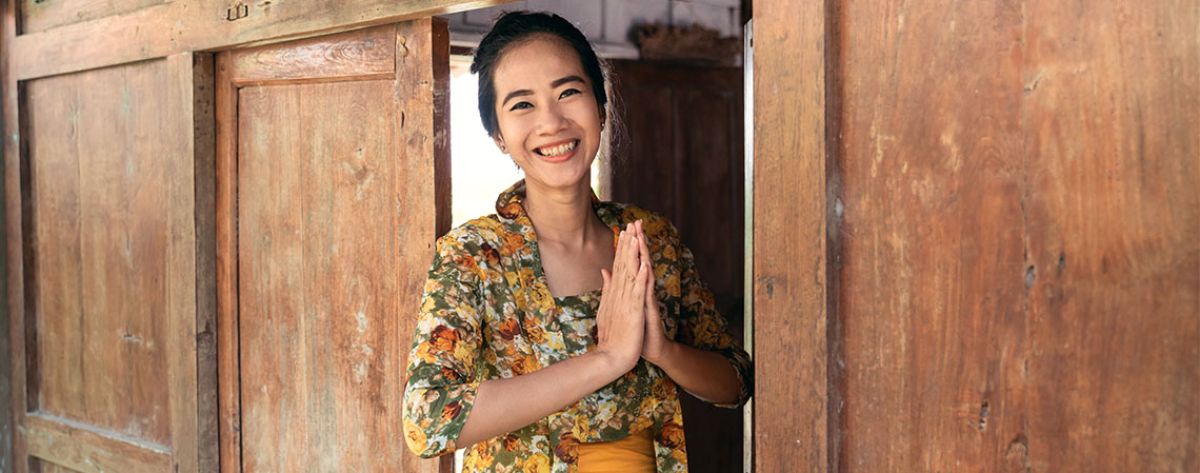Islam and Hospitality

Hospitality in the United States is generally based on what is polite or expected, and on the idea that in our culture we must be accepted and liked. If you were having a guest over to your home, you would make certain your house was spotless. You would put out your best dishes and napkins and serve nice food. The guests would be expected at a certain time, and if they are not there at that time, you might be offended. We tend to judge other cultures by our own, which is a mistake. It is good to understand how hospitality is viewed in other places.
Imagine you are living in a Muslim culture in Indonesia, and you have been invited to a friend’s house. In this setting, there are several things as a guest you must or must not do. For example, you would be careful not to arrive around mealtime, so your friend would not be obliged to serve you a meal. You would be sure to bring a gift for your host. Before entering, you would take your shoes off, and wait to be told where to sit. Your friend would offer you food or drink, but you should politely refuse. A conversation begins, and you would try to only talk about what you know your friend likes. Again, he offers you food or drink, and again, you would politely insist that you are not hungry or thirsty. After a third offer, you would accept some tea with your right hand and sip it as slowly as you can, because you must not seem too eager to eat or drink.
If you were the host, you would serve the food and drink as quickly as you could before your guest had the chance to ask, and you would not take it away until you are sure that your guest is satisfied. If you had multiple guests, you would serve the oldest first, and only talk about what your guest likes. When the time comes for him to leave, you would walk him all the way to the gate. Most importantly, you would always receive guests no matter who they are or when they come, even if they keep you from doing something else.
Muslims believe hospitality is a great virtue that unites a community. It is a basis of Muslim thinking, and it is what they are best known for. Muslims do not offer hospitality only to other Muslims; it is offered to anyone. A tradition demonstrated by Muslim prophets, hospitality is seen as a requirement that will be rewarded by Allah. If a follower of Islam were to refuse to offer hospitality to someone, it would be a great shame.
Islam is not the only religion in the Southeast Asian archipelago of Indonesia. Over three hundred ethnic groups are spread out over the 17,500 islands, but Indonesia is the largest Muslim-majority country in the world.
Most American Christians tend to view religion and everyday life as two totally different aspects. Some go to church on Sunday and see that as their “religion,” while for the rest of the week, they live their own lives. To a Muslim, Islam is not just a religion; it is their whole lifestyle. Every part of their lives is devoted to being a Muslim.
The Muslim idea of Allah is very different from what we know about God. Allah only loves those who do as he says without mistake, and those who are not followers of Islam must be destroyed. In contrast, God loves everyone unconditionally. Every person is made in the image of God and is therefore precious. This does not mean that everyone goes to Heaven, though. Because God loves us, He wants us to love Him in return enough to choose Him for ourselves. God knows that we will never be good enough to earn Heaven, so He gave us Jesus as a bridge to get to Him. Allah, on the other hand, says that if a person’s good outweighs his bad, then he can earn paradise. God wants us to know Him and have a relationship with Him, while Allah is removed and distant from mankind.
Because hospitality plays such a large role in Indonesian culture, it should definitely be considered when reaching Muslims. Indonesians strive for influence, dignity, honor, and respect; and they are very eager to please. Christians could begin by respecting the way they live and by knowing the culture and expectations, particularly when visiting in homes. They could know what Muslims think about striving to please Allah and show them a loving God. If missionaries would be willing to embrace the Indonesian view of hospitality, it could open a door to evangelizing the Muslims.






